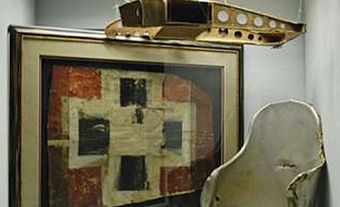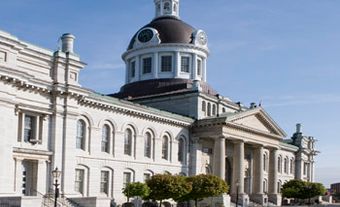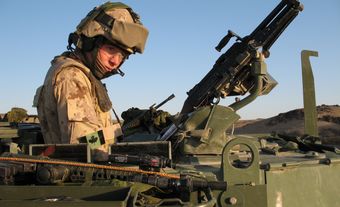The Royal Military College of Canada (RMC), Kingston, Ontario, is Canada’s premier military university. Established in 1876, RMC offers undergraduate and graduate programs in military and civilian fields, emphasizing leadership, strategic thinking, and academic excellence. The institution’s mandate is to produce officers who are both highly skilled military leaders and well-rounded professionals.

Foundation of the Royal Military College of Canada
The Royal Military College of Canada (RMC) stands on the site of significant historic events. Before RMC existed, Point Frederick – traditional territory of the Huron Wendat, the Anishinaabeg and the Haudenosaunee Peoples – was established as a naval depot in 1789 when the Lieutenant-Governor ordered the Provincial Marine to relocate to Kingston from Carleton Island. Kingston had been established as a refugee settlement for United Empire Loyalists in 1783-84. Though Kingston was not ideal for a naval station, it was Upper Canada's major population centre and therefore was officially a logical choice.
The War of 1812 transformed the little town of Kingston. In 1813, the Royal Navy absorbed the small army naval establishment. Kingston was the key to Upper Canada and the presence of the Royal Navy on Lake Ontario ensured its successful defence. Dockyard facilities were improved, and several stone buildings erected, including a stone warehouse known as the Stone Frigate, which still exists.
In 1816, Captain A.G. Douglas of the Nova Scotia Regiment proposed that a military college be established, but it would be 60 years before Canada had a college for training military officers. In 1874, Lieutenant-Colonel Walker Powell, acting Adjutant General of Militia, suggested that Canada establish a military school that would provide both a military and scientific education. Until that time, Canadian officer cadets had to study in England.
Prime Minister Alexander Mackenzie supported the idea. In short order, the government passed an Act to establish an institution "for the purpose of imparting a complete education in all branches of military tactics, fortification, engineering and general scientific knowledge in subjects connected with and necessary to a thorough knowledge of the military profession, and for qualifying officers for command and for staff appointments." Kingston, with its military history, was selected as the college site, and some of the buildings of the Naval Dockyard at Point Frederick were used for accommodation.
The school was modelled after the United States Military Academy in West Point, New York. RMC opened June 1st, 1876, with 18 cadets, staffed by British military officers and one Canadian civilian. Its early success was apparent in the remarks of Sir Charles Tupper to Sir Adolphe Caron, Minister of Militia, in 1886: "I regard the Canadian Military College as one of the best of its class in the world. The training and results are in every way of a high order, and the Americans themselves, I understand, say better than at West Point." The title “Royal” was conferred by Queen Victoria in 1878.

Royal Military College Graduates
The first class graduated on July 2nd, 1880. Before WWI, most ex-cadets took up civilian professions, especially engineering, and four graduates received commissions annually in the British army. After 1919, RMC was staffed by Canadians, the first Canadian commandant being Major-General Sir Archibald Macdonnell. Graduates were required to serve in either the active forces of the Crown or the Canadian Militia. The RMC engineering course was recognized as a qualification to practise the profession; certain Canadian universities and provincial law societies accepted RMC graduates to take degrees or diplomas in a final year. Many former cadets held high military rank during WWII.
RMC closed in 1942 but was reopened in 1948 as one of the tri-service Canadian Service Colleges (CSC). From 1954 the Regular Officers Training Plan (ROTP) required all CSC graduates to take a regular commission, but a small Reserve Entry was re-established in 1961. From 1959 RMC granted degrees, and graduate courses were added in 1964.
Curriculum and Core Values
In 1999, the core curriculum of RMC was renovated to emphasize key competencies over specific courses. These competencies include ethics, leadership, Canadian and military history, international affairs, and scientific disciplines, highlighting a comprehensive education to prepare students for leadership in the Canadian Armed Forces.
RMC's educational approach is structured around four pillars: academic excellence, military training, physical fitness, and bilingualism. The college ensures mandatory undergraduate degree instruction is available in both of Canada's official languages, which demonstrates its commitment to integrate and promote principles of equity, diversity and inclusion. RMC’s hiring practices, curriculum and institutional policies also reflect the college’s foundational values.
Le Collège militaire royal de Saint-Jean
In 1952, Prime Minister Louis St-Laurent's government determined the need for a bilingual military college to provide more equitable representation of French Canadians in the military and founded Le Collège militaire royal de Saint-Jean (CMR). The school received its own charter in 1985 and became authorized to grant post-graduate degrees in 1988. Amongst CMR graduates is Desmond Morton, one of Canada's most widely read historians and contributor to The Canadian Encyclopedia.
Since 2000, the Royal Military College has been administered as part of the Canadian Defence Academy (CDA). With the closure of Royal Roads Military College (RRMC) and Le Collège militaire royal de Saint-Jean in 1995 as part of the Liberal government's $1.3 billion cut to the defence budget, RMC became Canada's only military college until 2007, when CMR was reopened.
First Cohort of Female Cadets
The Royal Military College of Canada (RMC) marked a historic milestone in 1980 by admitting its first cohort of 32 female officer cadets, transitioning from an all-male institution. This was part of a broader move towards equity, diversity, and inclusion, reflecting societal changes and RMC's commitment to producing leaders who embody these values. Female cadets initially faced significant challenges, including heightened scrutiny and cultural biases, where they had to prove their competence without outshining male peers. In her book The Stone Frigate: The Royal Military College’s First Female Cadet Speaks Out, RMC graduate Kate Armstrong recounts her experience as a member of the first female cohort back in 1980. Armstrong received the Ontario Historical Society’s 2019-20 Alison Prentice Award for her work. In 2022, to commemorate the historic admittance of the first female officer cadets at RMC, the class of 1981 donated a bronze statue of a woman officer cadet to the college. This statue serves as a recognition of the diversification that began in the 1980s, marking a significant moment in the college's history toward inclusion and diversity.
Commitment to Indigenous Perspectives
The Royal Military College is currently engaged in efforts to indigenize its undergraduate curriculum, a process aimed at integrating Indigenous perspectives and knowledge across its educational programs. Through the establishment of the Curriculum Indigenization Working Group, RMC is reviewing processes used by other Canadian universities and engaging with Indigenous communities to form recommendations that respect the historical ties Indigenous peoples have to the RMC grounds.
Other programs, such as the Aboriginal Leadership Opportunity Year (ALOY), aims to connect Indigenous youth with the RMC and broader defense community, as well as lead positive changes within the Canadian military landscape by shaping an inclusive environment. These initiatives are part of a comprehensive plan to better reflect Canada's diverse heritage and respond to the Truth and Reconciliation Commission's calls for action.
See also Military and Staff Colleges and National Defence.

 Share on Facebook
Share on Facebook Share on X
Share on X Share by Email
Share by Email Share on Google Classroom
Share on Google Classroom



